Lochhead on Marketing
164 How to be a Legendary Creator/Writer: Sachit Gupta & Christopher Lochhead Unpack #1 Bestseller Snow Leopard
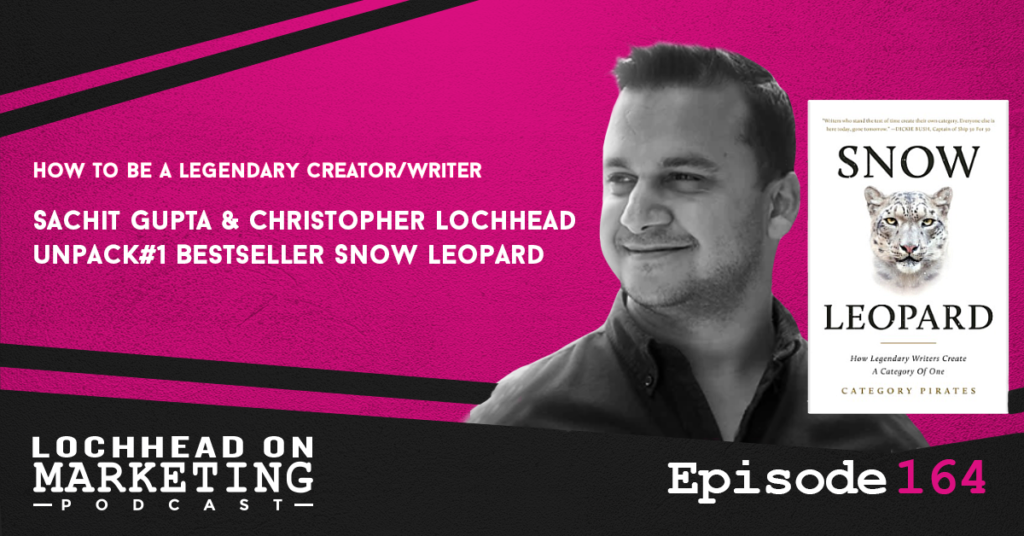
Podcast (lochheadonmarketing): Play in new window | Download (Duration: 1:37:55 — 67.2MB) | Embed
Subscribe: Apple Podcasts | Spotify | RSS | More
Recently, I was a guest with the legendary Sachit Gupta on his fantastic podcast called Conscious Creators, which I highly recommend. During our conversation on his podcast, we unpack Category Pirates’ most recent book Snow Leopard. Our producer Jason DeFilippo heard this podcast and thought it’d be a great idea to drop it here for you.
What you’re about to hear is me and Satya go deep on what it takes to be a successful native digital creator slash writer.
Welcome to Lochhead on Marketing. The number one charting marketing podcast for marketers, category designers, and entrepreneurs with a different mind.
The Reason for Podcasting
The conversation starts off with a discussion of how the two first met, and it was through the legendary podcaster Jordan Harbinger. Christopher was looking into getting sponsors and thinking about was to monetize his podcast, and was recommended to Sachit Gupta this way.
While he did get ideas on different styles of monetization, the biggest thing that Christopher got out of the conversation was the realization that monetization was not his primary focus on doing podcasts.
“I sort of had this aha that said, “Hey, wait a minute, dude, this was actually never about money”. And if I want to make money, I know how to go do that. So you sort of set my head straight, and that the emphasis was on the wrong syllable that if I wanted to make money, I knew how to go make money in a way that was much more exponential than being essentially an ad salesperson.
The real gift you gave me around podcasting, was that I’m not doing this to monetize.”
– Christopher Lochhead
Sachit Gupta on Monetizing Directly vs Indirectly
One of the things that Sachit wanted to share was that one doesn’t have to monetize directly. Focus on making good content first and foremost, so that you can reach out and cultivate an audience naturally, rather than going for cookie-cutter approaches for a short-term viral status.
“Here’s what I see happening in this greater world right now: there’s a stat that I think like 75% of youngsters want to be YouTubers, and the path most of them see in front of them is go on YouTube or something else and create content that’s for the extremes, because that’s what spreads. And then once you chase views and get to a certain level of audience, you can monetize in some way, right. And if you don’t become big, you can’t monetize. In your book, you call like the obvious content, which is not really the stuff that’s useful.”
– Sachit Gupta
While there is merit to uploading consistent content, you don’t have to flood your audience with bit-sized content that is just a big nothing burger. Creating meaningful content, let’s say once every week or two is way better than just dropping portion-sized content that just adds to the collective brain-rot of society.
The Content Pyramid
The topic then shifts to the concept of the content pyramid, and what types of people thrive in each level.
Consumers, for example, are at base of the pyramid and consists of the largest section of it. In internet culture, there is something known as the 1% rule, which states that on social media platforms, 1% create while 99% consume.
Most people spend their entire lives being content consumers—not content creators. And that’s totally fine, so long as you understand you’re not “playing the game.” You’re sitting on the sidelines watching the game.
In order to “get in the game,” you must move out of consumption and up The Content Pyramid.
To hear more of the conversation between Sachit Gupta and Christopher Lochhead, download and listen to this episode.
Bio
Connect with Sachit Gupta!
Website | Conscious Creators Show | Twitter | Instagram | LinkedIn
We hope you enjoyed this episode of Lochhead on Marketing™! Christopher loves hearing from his listeners. Feel free to email him, connect on Facebook, Twitter, Instagram, and subscribe on iTunes!
Pause for Democracy
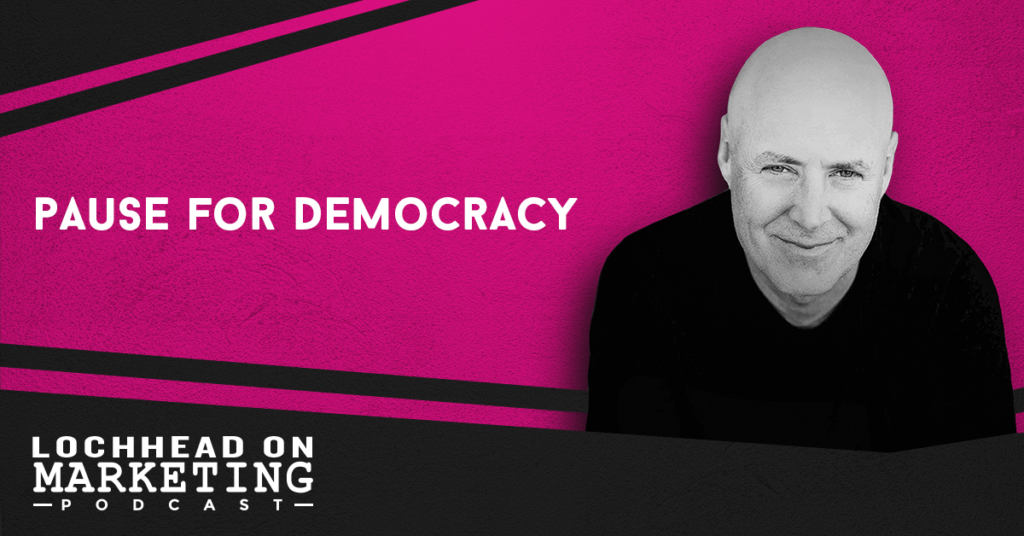
Podcast (lochheadonmarketing): Play in new window | Download (Duration: 1:52 — 1.3MB) | Embed
Subscribe: Apple Podcasts | Spotify | RSS | More
In observance of the Midterm Elections in the United States, we will not be dropping full normal episodes of Lochhead on Marketing this week. And if you are American, I do hope you get out and vote. It is, in my opinion, one of the most patriotic things you can do.
I also just wanted to read you a little something that I wrote recently on LinkedIn that I think is germane. Because whatever happens in the American midterms, roughly 50% of the country is going to be elated, and 50% of the country is going to be pissed. So let me do a little reading for you here.
“Today, more Americans hate more Americans than ever. And yet, we all know hating someone because they disagree with you might be the biggest stupid of them all. So how did this happen in the oldest surviving democracy in human history?
It’s because politicians, media, and social media, on both sides, create hate. Politicians, media, and social media, on both sides. monetize hate. We took the bait and internalize the hate, but it’s not too late.
We can start really thinking. We can start really dialoguing. We can start really making a difference. American on American hate stops with us. This is something every American can be a leader on, and frankly, everybody in the world can be a leader on. American on American hate stops with us. God bless America and God bless the world.”
163 How To Think Like A Category Designer | Category Pirates
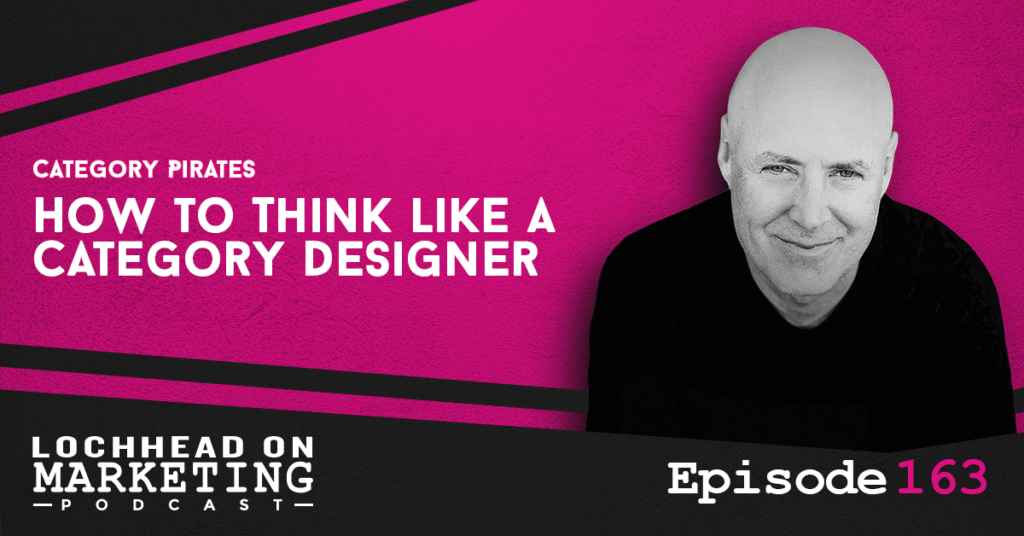
Podcast (lochheadonmarketing): Play in new window | Download (Duration: 20:28 — 14.1MB) | Embed
Subscribe: Apple Podcasts | Spotify | RSS | More
What percentage of the total value created in any given market category goes to the category designer or leader? That was a question that we had several years ago. And we thought there would be research about that. Well, when we were writing Play Bigger, we couldn’t find that data. So we had to create it. The number has been an extraordinary insight. It turns out that the company that wins the category earns 76% of the total value created in the space, as measured by market cap and or valuation. And that insight was so compelling, we actually published it in the Harvard Business Review.
On this episode, let’s dig into how you could be that person. How do you be that company that earns that 76%? Or seven another way? What are the different ways that category designers, the people who create and dominate new market categories think and become the one who earns that 76%?
Welcome to Lochhead on Marketing. The number one charting marketing podcast for marketers, category designers, and entrepreneurs with a different mind.
Category Design is a Game Of Thinking
Thinking about thinking is the most important kind of thinking for a Category Designer.
You are responsible for changing the way a reader, customer, or consumer “thinks.” You are successful when you’ve moved their thinking from the old way to the new and different way you are educating them about.
But what is “thinking?”
According to Roger Martin, arguably the world’s #1 management thinker, “thinking” is when you look at the world through an existing model. It’s how you use learnings from the past to make sense of the present. So when another driver cuts you off on the highway, you apply your past experiences to the present and swerve on reflex.
But almost all thinking is “reflexive” rather than “reflective.”
Consider the difference we laid out in our mini-book The Art of Fresh Thinking:
- “Reflexive” thinking: Having an unconscious “reflex” in response to ideas or opinions.
- “Reflective” thinking: Taking a moment to consciously reflect on how the past may have created a preexisting mental model keeping you from considering a new and different future.
Reflexive thinking causes a scarcity of fresh thinking in the world because it relies on mental scaffolding built in the past.
Some of the smartest people stopped reflective thinking a long time ago. We would even go so far as to say that being declared a smart person is almost certain to make you stupid. Because when you get called “smart,” you become entrenched in your comfortable past. When you’re smart, you know things. And most people who know things are called “experts.” Which means they already know. And when you already know, by definition you are using old mental scaffolding to consider new and different futures.
Which makes you stupid.
So, don’t strive to become an expert (ever!)—it’s the enemy of fresh thinking.
Here’s How a Category Designer Thinks
You are presented with information.
You become conscious of which model you are using to evaluate the information (which “lens” you are looking through).
And then before you react, respond, or give in to your reflexive nature, you pause and first consider which mental model you’re using to examine the information being presented. You train yourself to be curious, to ask why, to suspend your past opinions, beliefs, and mental models, and to open the aperture of your mind and consider something different.
That’s “thinking.”
Our friend, Mike Maples Jr., calls this “Backcasting.”
“Legendary builders must stand in the future and pull the present from the current reality to the future of their design. So an important additional job of the builder is to persuade early like-minded people to join a new movement.”
To learn more on how you can become a Category Designer and start thinking more reflectively, download and listen to this episode. You can also read more about it at Category Pirates.
Bio
Christopher Lochhead is a #1 Apple podcaster and #1 Amazon bestselling co-author of books: Niche Down and Play Bigger.
He has been an advisor to over 50 venture-backed startups; a former three-time Silicon Valley public company CMO and an entrepreneur.
Furthermore, he has been called “one of the best minds in marketing” by The Marketing Journal, a “Human Exclamation Point” by Fast Company, a “quasar” by NBA legend Bill Walton and “off-putting to some” by The Economist.
In addition, he served as a chief marketing officer of software juggernaut Mercury Interactive. Hewlett-Packard acquired the company in 2006, for $4.5 billion.
He also co-founded the marketing consulting firm LOCHHEAD; the founding CMO of Internet consulting firm Scient, and served as head of marketing at the CRM software firm Vantive.
Don’t forget to grab a copy (or gift!) of one of our best-selling books:
- ❄️ Snow Leopard: How Legendary Writers Create A Category Of One
- ⚒️ The Category Design Toolkit: Beyond Marketing: 15 Frameworks For Creating & Dominating Your Niche
- 📣 A Marketer’s Guide To Category Design: How To Escape The “Better” Trap, Dam The Demand, And Launch A Lightning Strike Strategy
We hope you enjoyed this episode of Lochhead on Marketing™! Christopher loves hearing from his listeners. Feel free to email him, connect on Facebook, Twitter, Instagram, and subscribe on iTunes!
162 PR / Communications: A Very Different Point-of-View
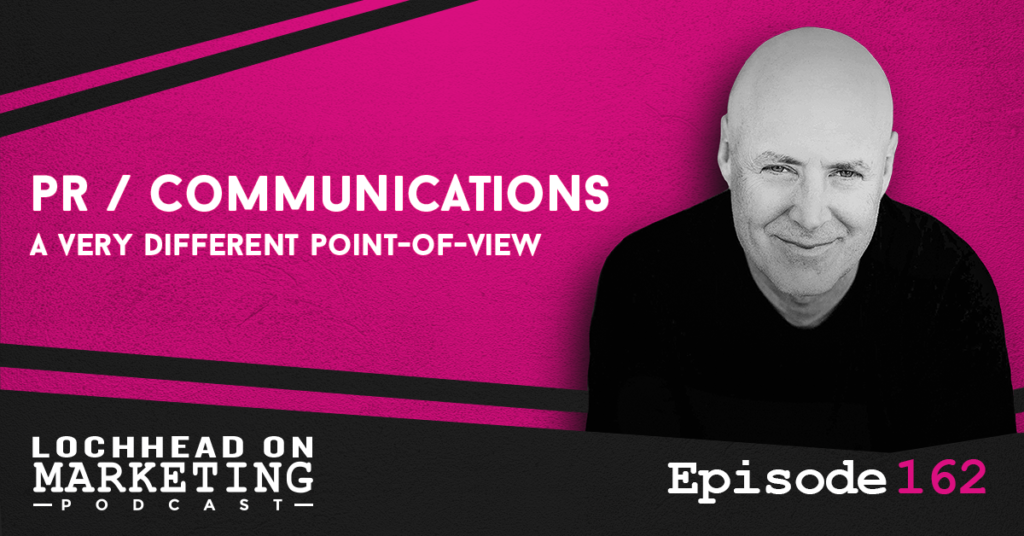
Podcast (lochheadonmarketing): Play in new window | Download (Duration: 14:20 — 9.8MB) | Embed
Subscribe: Apple Podcasts | Spotify | RSS | More
On this episode of Lochhead on Marketing, let’s talk about public relations/communications, and a very different point of view about that. In particular, why your content is your marketing.
Towards the end, we’ll talk about five easy steps to consider when building your own direct audience, and bypassing the legacy publications: the old-school, dusty gatekeepers.
Welcome to Lochhead on Marketing. The number one charting marketing podcast for marketers, category designers, and entrepreneurs with a different mind.
The Problem with Legacy Media
This episode is inspired in part by a conversation I had with a CEO friend, which I then posted on LinkedIn. It reads:
A CEO friend just asked me, if he should go to a PR/Marketing smooze event with the legacy business media. Here’s my advice.
(Warning: I’m biased. But for a reason) The bulk of legacy media is a waste of time.
I used to write for many of the biggest legacy business media outlets. Stopped 5+ years ago, because a) (almost) no one reads it and b) it is mostly clickbait. No one reads Forbes fortune Fast Company, Inc, etc. anymore.
Your best ROI will come from building your own media and thought leadership. And the AHA here is every company needs to be a media company.
Playing Both Sides
Another issue is that even as these legacy media have gone digital, they still rely on cookie cutter strategies and clickbait-y articles. They play the SEO game to keep their websites on top of searches, and then have companies pay to be featured as top so-and-so in a category.
Some even go as far as charging subscription to access their media, which is a whole other reason why people don’t read their stuff anymore. You pay to get the “information”, only to find out that it’s something you can probably read 2 lines down the search results.
Essentially, they are trying to get revenues from both sides of the process, which will eventually lead to burning both ends of the stick faster. They are still clinging to traditional ways, which shows even when they went digital.
Go Direct to the Source
So rather than subscribing to “publication lists” that doesn’t really net you any traffic, it’s best to do it in-house and go direct to the source by tapping into the digital market itself.
You can start small with building up channels in various social media platforms, and promoting your content and linking back to your website if they are interested for more. At the very least, you now have a platform to actively engage your audience, and get a pulse of what works and what doesn’t, and go from there.
To find out the other steps in doing better PR and communications on your own, download and listen to this episode.
Bio
Christopher Lochhead is a #1 Apple podcaster and #1 Amazon bestselling co-author of books: Niche Down and Play Bigger.
He has been an advisor to over 50 venture-backed startups; a former three-time Silicon Valley public company CMO and an entrepreneur.
Furthermore, he has been called “one of the best minds in marketing” by The Marketing Journal, a “Human Exclamation Point” by Fast Company, a “quasar” by NBA legend Bill Walton and “off-putting to some” by The Economist.
In addition, he served as a chief marketing officer of software juggernaut Mercury Interactive. Hewlett-Packard acquired the company in 2006, for $4.5 billion.
He also co-founded the marketing consulting firm LOCHHEAD; the founding CMO of Internet consulting firm Scient, and served as head of marketing at the CRM software firm Vantive.
We hope you enjoyed this episode of Lochhead on Marketing™! Christopher loves hearing from his listeners. Feel free to email him, connect on Facebook, Twitter, Instagram, and subscribe on iTunes!
161 Adobe is Smart & Wall Street is Dumb: Why the $60B Figma Acquisition is Legendary Category Design
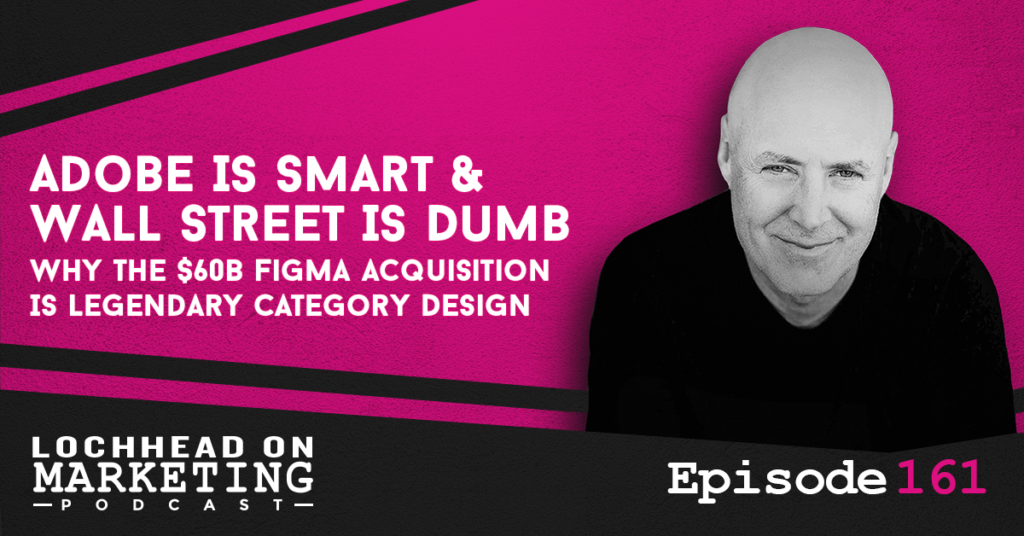
Podcast (lochheadonmarketing): Play in new window | Download (Duration: 19:04 — 13.1MB) | Embed
Subscribe: Apple Podcasts | Spotify | RSS | More
On September 15 2022, Adobe announced it was buying startup Figma for 20 billion US dollars. This is one of the largest private company purchases in Silicon Valley history. They paid approximately 50 times Figma’s 2022 revenue, and Wall Street hated it.
Skeptics are saying that Adobe paid an “astronomical price” for a company projected to book only 400 million in ARR annualized reoccurring revenue this year. And this is exactly what people who do not understand how categories work. The “experts” on Wall Street when deals like this go down, are almost always wrong.
Welcome to Lochhead on Marketing. The number one charting marketing podcast for marketers, category designers, and entrepreneurs with a different mind.
Wall Street Mercenaries
Let’s start off with an interesting tidbit that I experienced by interacting with Wall Street.
As I was doing a little bit of consulting and insulting back then, a group approached me about their matchmaking service. Simply put, they would match executives and experts to Wall Street folks, and they pay for your time so they could ask you questions and advise on certain things.
The idea intrigued me, so I signed up for it. But it turns out, the Wall Street guys only wanted to ask for speculations and opinions on certain company’s performance and how it would affect the market, what stocks were going to tank, etc.
The AHA here is that most people (this is a generalization) in Wall Street are mercenaries. They’re looking to make money in the now term, short term. They don’t create a significant value in the economy. They just try to anticipate what might happen tomorrow, so that they can play a financialization game.
While there are exceptions to this, it’s generally the perception most people have of them.
How to Confuse a Wall Street Folk
As we’ve discussed before, there are two kinds of acquisition deals when you look at them from the high level. There are consolidation deals and acceleration deals.
Consolidation deals happen when a certain company is not growing anymore, and their solution for it is to merge with another company to get a bigger share of the market and look like they have “growth”. Value investors like the Wall Street folks typically thrive and look out for such deals, as it fulfills their requirements for “growth” and revenue increase.
Acceleration deals is when a company acquires another because they see value on it once they have developed it. They company or IP they purchased may not have a huge valuation at the moment, but it could be a gold mine for them once it is fully fleshed out.
Acceleration deals tend to confuse Wall Street folk, as they are focused in the “now”, and could not fathom the significance of such a deal entails, unless it affects the current quarter. Hence, they do not understand what Adobe did, which is why they hate it.
To hear more about the Adobe deal and why Wall Street folks hate it, download and listen to this episode.
Bio
Christopher Lochhead is a #1 Apple podcaster and #1 Amazon bestselling co-author of books: Niche Down and Play Bigger.
He has been an advisor to over 50 venture-backed startups; a former three-time Silicon Valley public company CMO and an entrepreneur.
Furthermore, he has been called “one of the best minds in marketing” by The Marketing Journal, a “Human Exclamation Point” by Fast Company, a “quasar” by NBA legend Bill Walton and “off-putting to some” by The Economist.
In addition, he served as a chief marketing officer of software juggernaut Mercury Interactive. Hewlett-Packard acquired the company in 2006, for $4.5 billion.
He also co-founded the marketing consulting firm LOCHHEAD; the founding CMO of Internet consulting firm Scient, and served as head of marketing at the CRM software firm Vantive.
We hope you enjoyed this episode of Lochhead on Marketing™! Christopher loves hearing from his listeners. Feel free to email him, connect on Facebook, Twitter, Instagram, and subscribe on iTunes!
160 The Content Pyramid: 5 Levels of Becoming a Legendary Writer, Creator, & Thought Leader
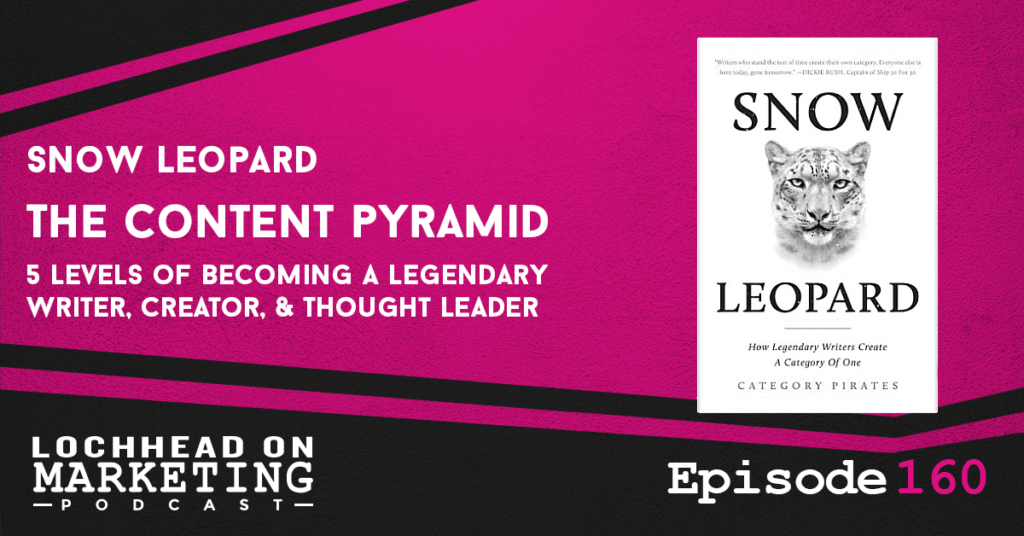
Podcast (lochheadonmarketing): Play in new window | Download (Duration: 53:39 — 36.8MB) | Embed
Subscribe: Apple Podcasts | Spotify | RSS | More
Welcome to a special episode of Lochhead on Marketing, where we dive further into our new book called Snow Leopard. On this episode, we discuss the Content Pyramid, and how one can become a legendary creator, writer, and thought leader.
But before all that, we’d like to say thank you very much to all who took the time to read our new book and share it around. It’s also caused a tremendous amount of conversation in the entrepreneur, marketing, and writer/creator world. Because today, more than ever, being able to change the world with words, matters.
Welcome to Lochhead on Marketing. The number one charting marketing podcast for marketers, category designers, and entrepreneurs with a different mind.
The Problem
Everybody wants to be a thought leader. They want to be seen as forward thinking, they want to be celebrated as the Guru, the expert, the All Knowing one in their industry, they want to be the keynote speaker, the bestselling author, the person listed in the next 10, marketers to watch in 2002 by Forbes, most of which are paid placements. Because now that the world has gotten exposed to the power of digital attention, and everyone believes the most valuable thing you could possibly have is an audience.
Well, everybody wants one for themselves. Unfortunately, as we wrote about in our mini book, The Me Disease, the vast majority of people who want to be a thought leader, or bestselling author in today’s digital gamified world, don’t have any leading thoughts. That is to say, they’re not actually contributing new differentiated ideas. What they want is to be seen as a thought leader, to collect badges of approval, and amass followers, and social metrics that send the signal that lots of other people say they are important, without having to say anything unique or meaningful, or different. More importantly, they want the audience without having to take the time to think deeply about who they are creating for and why they want the outcome without the process.
Content-Free Content
Since this has become such a desirable goal, there are now strategies for shortcutting your way to instant status gratification. The key is to cater to the lowest common denominator. The way the business world has been educated on how to become an overnight thought leader is to create content that doesn’t threaten, doesn’t challenge, and doesn’t require the audience to think, as loud and as often as possible. This strategy caters to lazy button smashing consumers.
We call this Content-free Content. It gets likes and views, and it lands you some followers. But after you the consumer, eat it, you sort of feel like a box full of Oreos. Zero nutritional value full of empty calories, and left feeling stupid.
The Content Pyramid
Ask yourself: do you want acceptance, or do you want to make a difference? If you want to be a legendary writer, creator, entrepreneur, executive or industry thought leader, you need to be honest with yourself about a how you measure success and be what category you’re going to play in.
Also, when you create you are creating something for someone. Anyone who says “Yeah, well I just want to create for myself” is a beginner and hasn’t gotten far enough down the road to realize they aren’t who matter: the reader, the listener, the viewer is who matters.
To hear the full chapter about the Content Pyramid and how to become a successful thought leader, download and listen to this episode.
Bio
Christopher Lochhead is a #1 Apple podcaster and #1 Amazon bestselling co-author of books: Niche Down and Play Bigger.
He has been an advisor to over 50 venture-backed startups; a former three-time Silicon Valley public company CMO and an entrepreneur.
Furthermore, he has been called “one of the best minds in marketing” by The Marketing Journal, a “Human Exclamation Point” by Fast Company, a “quasar” by NBA legend Bill Walton and “off-putting to some” by The Economist.
In addition, he served as a chief marketing officer of software juggernaut Mercury Interactive. Hewlett-Packard acquired the company in 2006, for $4.5 billion.
He also co-founded the marketing consulting firm LOCHHEAD; the founding CMO of Internet consulting firm Scient, and served as head of marketing at the CRM software firm Vantive.
We hope you enjoyed this episode of Lochhead on Marketing™! Christopher loves hearing from his listeners. Feel free to email him, connect on Facebook, Twitter, Instagram, and subscribe on iTunes!
159 Successful or Useful?: Learning from Drucker
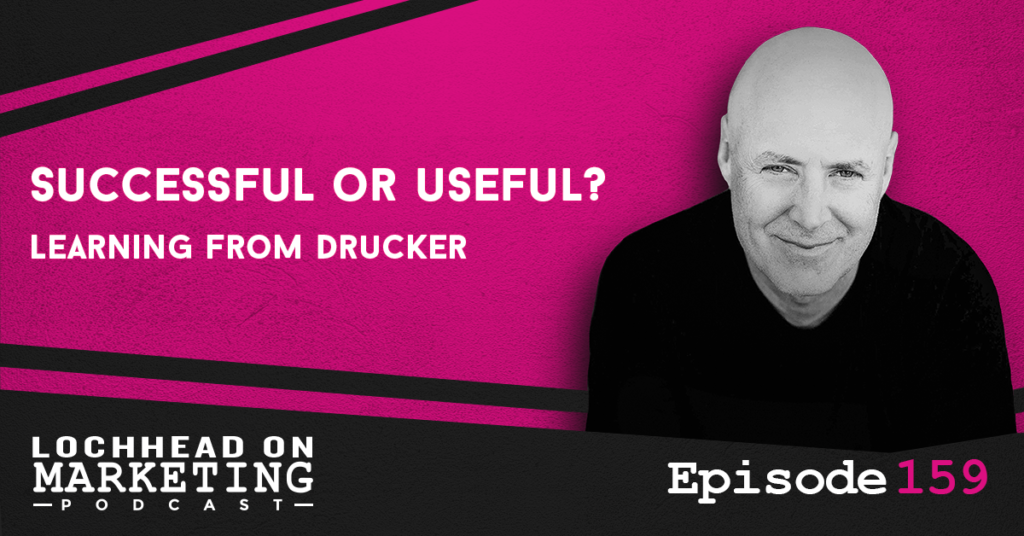
Podcast (lochheadonmarketing): Play in new window | Download (Duration: 8:09 — 5.6MB) | Embed
Subscribe: Apple Podcasts | Spotify | RSS | More
Peter Drucker is considered the father of modern business management. If there was a Mount Rushmore of business thinking, he’d be on it. Recently on Category Pirates, we’ve begun work on the evolution of Peter Drucker’s concept of a knowledge worker, to what can today be called as the emergence of an intellectual capitalist.
So I wanted to look back on Peter Drucker’s ideas that had a huge impact on me, and see if we can apply more of them in our current endeavors. His book, The Effective Executive, helped me become an organized person and an effective executive of my own. And when I read the foreword in the latest edition that was written by Jim Collins, it struck something profound, which I hope to share with you.
Welcome to Lochhead on Marketing. The number one charting marketing podcast for marketers, category designers, and entrepreneurs with a different mind.
The Effective Executive: Foreword
Here’s the foreword by Jim Collins:
My first meeting with Drucker is one of the 10 most significant days of my life. Peter had dedicated himself to one huge question: how can we make society both more productive and more humane?
His warmth, as when he grasped my hand in two of his upon opening his front door and said, “Mr. Collins, so very pleased to meet you please come inside”, bespoke his own humanity. But he was also incredibly productive. At one point, I asked him which of his 27 books he was most proud of, to which Drucker, then 86, replied, the next one. He wrote 10 more.
At the end of the day, Peter hit me with a challenge. I was on the cusp of leaving my faculty spot at Stanford, betting on a self-created path. And I was scared.
“It seems to me you spend a lot of time worrying about how you will survive”, said Peter. “You will probably survive”, he continued, “and you seem to spend a lot of energy on the question of how to be successful. But that is the wrong question”. He paused. Then, like the Zen master thwacking the table with a bamboo stick, “the question is, how to be useful.” A great teacher can change your life in 30 seconds.
I know that there have been moments in my life where I wondered if I was going to survive or make it. And the interesting teaching here that Jim is sharing with us from Peter, is that when we turn our effort, our focus on being useful to others, ourselves become less important.
So if you’re somebody right now, who’s wondering how to be successful or worried that maybe you won’t survive, or maybe that your startup or your career is on the wrong path. I would just underscore the story, you’ll probably survive. Like Peter said, the real question is, how can we all be useful?
Bio
Christopher Lochhead is a #1 Apple podcaster and #1 Amazon bestselling co-author of books: Niche Down and Play Bigger.
He has been an advisor to over 50 venture-backed startups; a former three-time Silicon Valley public company CMO and an entrepreneur.
Furthermore, he has been called “one of the best minds in marketing” by The Marketing Journal, a “Human Exclamation Point” by Fast Company, a “quasar” by NBA legend Bill Walton and “off-putting to some” by The Economist.
In addition, he served as a chief marketing officer of software juggernaut Mercury Interactive. Hewlett-Packard acquired the company in 2006, for $4.5 billion.
He also co-founded the marketing consulting firm LOCHHEAD; the founding CMO of Internet consulting firm Scient, and served as head of marketing at the CRM software firm Vantive.
We hope you enjoyed this episode of Lochhead on Marketing™! Christopher loves hearing from his listeners. Feel free to email him, connect on Facebook, Twitter, Instagram, and subscribe on iTunes!
158 Crossing the Chasm & 22 Immutable Laws of Marketing: Through the Category Lens with Matt Johnson of the One Book That Changed My Life Podcast
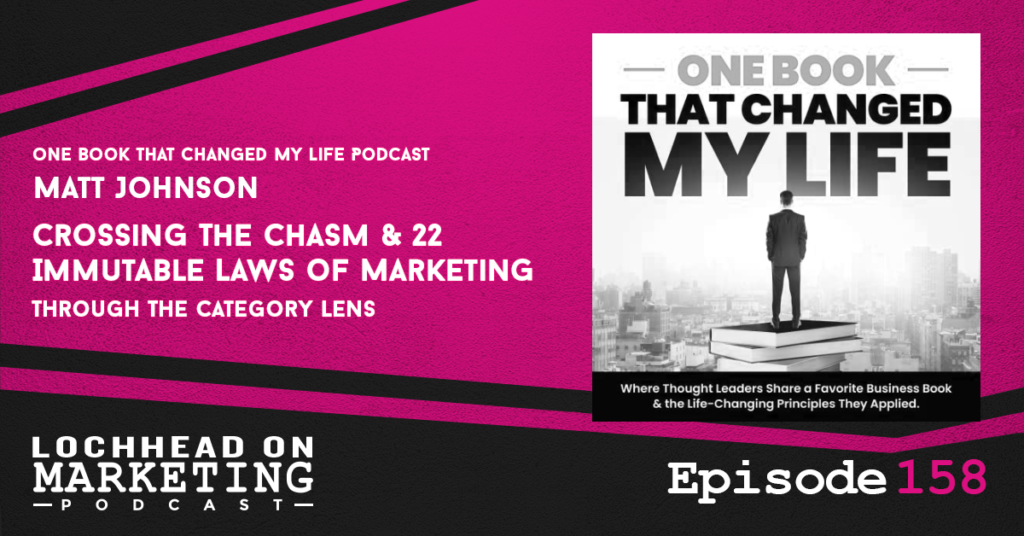
Podcast (lochheadonmarketing): Play in new window | Download (Duration: 54:29 — 37.4MB) | Embed
Subscribe: Apple Podcasts | Spotify | RSS | More
On this episode of Lochhead on Marketing, Matt Johnson and I have a conversation about the book that changed my life. In my case, it was two books in particular that changed my life. We look into them through a category lens perspective in Matt Johnson’s new podcast, One Book That Changed My Life Podcast.
Matt Johnson is the founder of PursuingResults.com. Matt and his firm were the original producers of my original Oddcast back in the Legends and Losers days, and he’s taught me a ton about podcasting. He’s got a legendary podcast called MicroFamous. Of late, he started a new podcast called one book that changed my life.
Welcome to Lochhead on Marketing. The number one charting marketing podcast for marketers, category designers, and entrepreneurs with a different mind.
Matt Johnson & Christopher Lochhead on how the two books made a difference
After a brief introduction of who Christopher Lochhead is and his works, Matt Johnson starts the discussion on the book. Particularly on the topic of what the situation was when he was reading the books for the first time, and how it affected Christopher and his views.
Christopher then talks about his background when he was first starting out his business as an entrepreneur and still learning the ropes. While there were a lot of books on marketing available, there was something about the 22 Immutable Laws the made him think, “this is the one.”
“I started to read them early on, and, and it immediately spoke to me. What their work really spoke to was, if you want to stand out, if you want to be super successful, and you want to make a big difference, you got to do it by being kind of radically unique in some way.” – Christopher Lochhead
Matt Johnson & Christopher Lochhead on the 22 Immutable Laws
Of the topic of the 22 Immutable Laws book, the one law that really stood out to Christopher was the 2nd law, which is the Law of Category. It states that, “if you can’t be first in the category, then set up a new category that you can be first.” Looking back, that law describes Category Design quite nicely.
Christopher also brings up the idea of the importance of solidifying and codifying your ideas and defining them as a category, rather than just sharing new thinking without establishing it first. Because it leaves others the chance to improve upon it and move into the category before you, and by then you’ve lost the category despite being the actual first to think about it.
Matt Johnson & Christopher Lochhead on Crossing the Chasm
As for Crossing the Chasm, Christopher explains that the book presents a great framework for understanding how new markets in tech, and in these days, pretty much all digital-related markets.
The book explains how new market categories develop. It has a standard kind of bell curve which introduces a non-obvious problem that anybody who’s introduced a new tech category has experienced, but had no lens or way of understanding the concepts.
On the side of the rising bell curve, you have the few innovators, followed by the slowly increasing number of early adopters. At the peak, you have the early majority, who mostly benefit from the experiments and not repeating the same mistakes as early adopters might have incurred. Then you have the downward slope, which features the late majority and the laggards who are late to the party.
To hear more from Matt Johnson and the rest of the podcast, download and listen this episode.
Bio
Matt Johnson is a marketing agency founder, podcaster, and musician. He runs a podcast launch & production agency based in San Diego, an international team that helps business coaches, consultants and thought leaders use done-for-you podcasting to attract an audience, build influence & become MicroFamous.
Matt is the author of MicroFamous and currently hosts the MicroFamous podcast. He is a frequent podcast guest and event speaker to audiences around the US, Canada, and Australia.
Links
Connect with Matt Johnson!
PursuingResults.com | One Book That Changed My Life Podcast | MicroFamous
We hope you enjoyed this episode of Lochhead on Marketing™! Christopher loves hearing from his listeners. Feel free to email him, connect on Facebook, Twitter, Instagram, and subscribe on iTunes!
157 How Category Contenders Become Category Leaders with Al Ramadan, Co-Author of Play Bigger
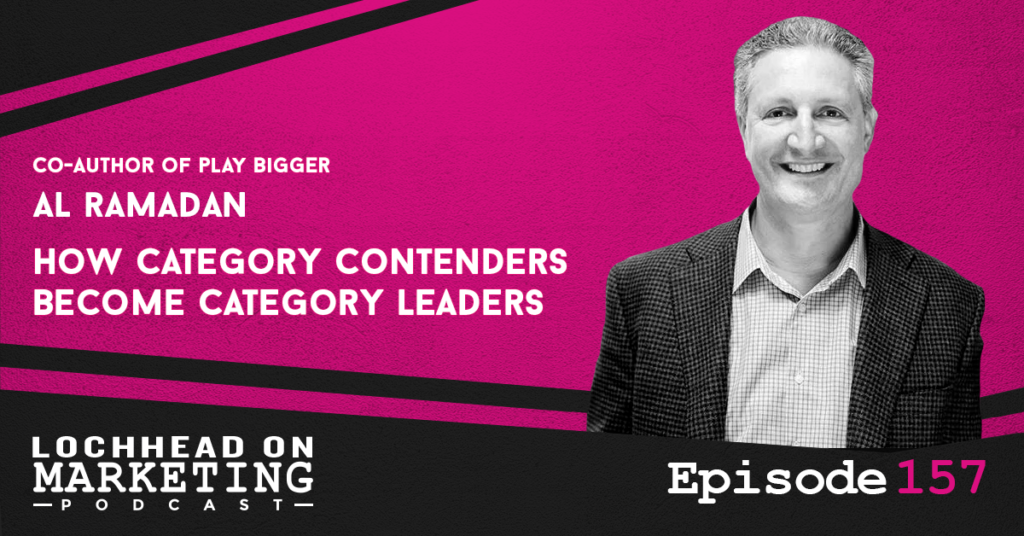
Podcast (lochheadonmarketing): Play in new window | Download (Duration: 1:12:12 — 49.6MB) | Embed
Subscribe: Apple Podcasts | Spotify | RSS | More
On this episode of Lochhead on Marketing, our guest Al Ramadan talks about what’s at stake when it comes to category battles, how you can spot the category challengers who can become category kings and queens, and what they need to become category leaders that earn 76% of the economics.
There comes a time in every startup’s life, where they face an epic, typically 18-to-36-month category battle. As we reported in our first book Play Bigger, the company that wins that battle earns 76% of the total value created in the category as measured by the market caps for public companies and valuations for private companies. What that means is, in any space, one company earns two thirds of the economics, which makes that category battle, which is typically 18 to 36 months long, arguably the highest stakes game in business.
This episode will be available on both Christopher Lochhead: Follow Your Different and Lochhead on Marketing, because we think it is that important that everyone must hear about it. So without further ado, let’s dive into this dialogue.
Play Bigger: Looking back, and its impact today
Al Ramadan comes into the conversation bearing data about the businesses and companies we’ve observed when writing Play Bigger, as well as some new players that have achieve the same feat since then.
To recap, Al Ramadan and Christopher Lochhead wrote a book back in 2014 called Play Bigger, which talks about category design and how it can make you become a category leader in your chosen space. One of the things they’ve found out in the course of their research is that Category Leaders tend to corner 76% of the value of said space.
Though when they wrote Play Bigger, the world was nowhere near as digitized as it is today. So a lot of the research was based on tech companies back then. But now, as more and more categories are behaving like tech categories due to digital scalability and digital reach, these findings are becoming true for every category.
Category Kings to Category Leaders
Al Ramadan shares that he and his team looked into the 35 Category Kings that they have observed back in Play Bigger, and check on their current situation in the market sphere.
In Play Bigger, we originally published a set of research and tracked 35 Category Kings in the tech space and their market caps at the time were 465 billion and those same companies today are now worth 1.9 trillion.
“If you track what happened to those 35 kings, as we call them back then, between the year of 2014 to the year of 2021. You want to know what the numbers are? At the time in 2014, the entire pool of the 35 category kings were valued at 465 billion. They are now valued at 1.9 trillion. That is, they’ve created more than $1,000,001.5 in market cap and the annual for those people who care about this stuff like Investors and Financial people. The compound interest growth rate of those kings. Market cap wise, is 22.46%.” – Al Ramadan
Given this data, it begs the question of how many understand that this is the new dynamic, and how many entrepreneurs and marketers still think that it’s a big leap of faith to follow.
To hear more from Al Ramadan and how Category Kings can become legendary Category Leaders, download and listen to this episode.
Bio
Al Ramadan is a co-founding partner of Play Bigger Advisors and coauthor of the book, Play Bigger. He also co-founded Quokka Sports, which revolutionized the way people experience sport online.
Al then joined Macromedia and Adobe, where he spent almost ten years changing the way people think about great digital experiences. At Adobe, Al led teams that created the Rich Internet Applications category and helped develop the discipline of experience design.
In the early ‘90s he applied data science to Australia’s Americas Cup — an innovation in sports performance analytics. His work in sailing led directly to the idea for Quokka. He lives in Santa Cruz, California.
Links
Connect with Al Ramadan!
Play Bigger | LinkedIn | Category Contenders
We hope you enjoyed this episode of Lochhead on Marketing™! Christopher loves hearing from his listeners. Feel free to email him, connect on Facebook, Twitter, Instagram, and subscribe on iTunes!

